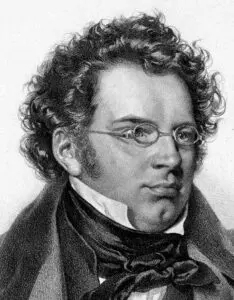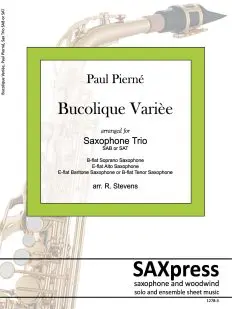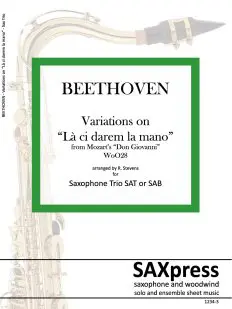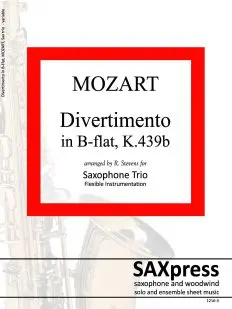Trio in B-flat D471
Franz Schubert (1797 – 1828)
Saxophone Trio SAT or SAB
Trio in B-flat D471 by Franz Schubert arranged for Saxophone Trio SAT or SAB.
Like so many of Schubert’s instrumental works, Trio in B-flat D471 is an incomplete composition. The string trio consists of a completed first movement marked ‘Allegro’ and only a few bars of a slower second movement. In many ways it looks back to earlier composers such as Haydn and Mozart. This transcription for saxophone trio is of the complete first movement only.
With this arrangement you get:
- Full trio score (SAT)
- Part 1: Soprano Saxophone
- Part 2: Alto Saxophone
- Part 3A: Tenor Saxophone
- Part 3B: Baritone Saxophone (tenor saxophone alternate)
There is one instance of altissimo in each of the soprano, alto, and baritone parts. Suggestions are given for alternate notes should that be necessary. The tenor part require no altissimo. Additionally the bari part often goes quite high in its standard range. Trio in B-flat D471 was originally scored for the usual string trio ensemble of violin, viola, and cello. This transcription is for saxophone trio: soprano, alto, and either tenor or baritone saxophones (parts are included for both). It is a straightforward example of Classical sonata-allegro form. This arrangement is in the original key of B-flat major. It is in common time (4/4) throughout. The tempo stays at ‘allegro’ throughout. Intermediate-advanced players should have no problems with this work.
- The range for each saxophone part is shown below.
- Audio and score excerpts are available above.

About the Composer
 Franz Peter Schubert (31 January 1797 – 19 November 1828) was an Austrian composer of the late Classical and early Romantic eras. Despite his short life, Schubert left behind a vast body of works including more than 1000 compositions.
Franz Peter Schubert (31 January 1797 – 19 November 1828) was an Austrian composer of the late Classical and early Romantic eras. Despite his short life, Schubert left behind a vast body of works including more than 1000 compositions.
The son of a schoolmaster who had settled in Vienna, Franz Schubert was educated as a chorister of the imperial court chapel. He later qualified as a schoolteacher, briefly and thereafter intermittently joining his father in the classroom. He spent his life largely in Vienna, enjoying the company of friends, but never holding any position in the musical establishment or attracting the kind of patronage that Beethoven had 20 years earlier. His final years were clouded by illness as the result of a syphilitic infection, and he died aged 31, leaving much unfinished.
His gifts had been most expressed in song, his talent for beautiful melody always evident in his other compositions. Schubert wrote works in every genre of his time including opera, church music, symphonies, chamber music, choral and vocal music, and piano music. His compositions are generally numbered according to the Deutsch catalogue, with the letter D.










Reviews
There are no reviews yet.